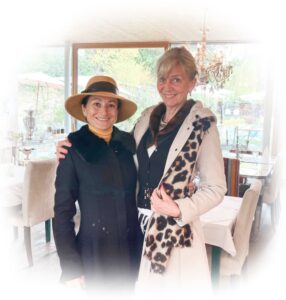
Play Video
In a collaborative effort with Mama Organisation (www.mama.or.ke), the purpose of this documentary is to collect funds to – empower women to become more entrepreneurial in Kenya – contribute to coaching as a social impact instrument – introduce ways in which we can democratise coaching without coaches needing to earn less Using the donations given to this documentary, we will roll out coaching and coach training for the women working for and the leadership serving Mama Organisation in Kenya starting 2023. If you are inspired by coaching as a social impact instrument and you yourself wish to engage more in coaching for social impact as well as in democratising coaching, this documentary is definitely something you should watch and make a donation to. And, most importantly, allow yourself to be inspired to reflect the field of coaching and your own practice from the angle of the ‘light and shadow’ of coaching. Enjoy!
Integrative Presence™ is a
philosophy and methodology
informed by the findings of the coaching presence research project conducted between 2017 and 2019. It stands on three
giants’ shoulders
: a) presence-based coaching; b) complex adaptive systems theory (CAS); and c) integral theory.
In its inception, it was shaped by ICF MCC coach
Samer Hassan
’s deep practical wisdom and teaching of Somatic Thinking© and later refined in partnership with organizational psychologist and learning & development expert
Claire Venetsanakou
into a fully-fledged training program for executive coaches and leadership.
Integrative Presence is defined as
“a purposeful
dynamic interplay
that emerges as measurable
non-verbal energy
from the interpersonal interactions … through the doorways of the
mind, body and heart
as each mind, body and heart influences and adapts to the other mind, body and heart as a
relational phenomenon
in clients’ change process implying that the coach changes in the dynamic interplay too.”
(Erdös, 2021, p. 60).
Presence integrates the:
-
self of either coach or client / leader or employee ( I-Sphere )
-
relationship between coach and client / leader or employee ( WE-Sphere )
-
social system coach and client / leader and employee(s) form ( ALL-Sphere )
-
universe as a global legacy of how we are and behave with each other ( OMNI-Sphere )
Why Integrative Presence™?
Integrative Presence™ offers a
solid anchor
for any executive coach and/or leader in organizations interested in
building awareness
of why and how clients or employees feel inspired to
trust
,
engage with, stay loyal to,
and
identify with
them any given moment. Awareness of these dynamics lends itself to resolve issues of mistrust, disengagement, disrespect, and resistance due to lack of identification with the coach or leader working in complex environments.
As a professional full-time executive coach, I am inspired to promote best practice in coaching at organizations and take responsibility in developing the profession as a whole. In doing so I am looking for ways to develop my own practice. Contributing as a researcher is about joining the global thinking regarding the future of coaching both as a business and profession. Research enhances our understanding and informs our practice. We need deep understanding of what works for our clients, after all it is our clients that we are committed to serve. Therefore, those who wish to serve clients need to be aware of what research is telling us about what is merely a flight of fancy, or what is data-based. It also creates opportunities for deep reflection and learning with a ripple-effect.
For academic affiliations in the PhD research, click here.
For academic affiliations in the PhD research, click here.
Affiliations
a.) Vrije Universiteit Amsterdam: looking further VU is an open organization, strongly linked to people and society. What matters is not just the acquisition of a greater depth of knowledge, but also a wider one. VU asks and expects students, researchers, PhD candidates and employees to look further – to look further than their own interests and their own field, and further than what is familiar and further than the here and now.
a.) Vrije Universiteit Amsterdam: looking further VU is an open organization, strongly linked to people and society. What matters is not just the acquisition of a greater depth of knowledge, but also a wider one. VU asks and expects students, researchers, PhD candidates and employees to look further – to look further than their own interests and their own field, and further than what is familiar and further than the here and now.
b.) ABRI – Amsterdam Business Research Institute, Vrije Universiteit
The mission of Amsterdam Business Research Institute (ABRI) is to promote excellence in knowledge creation and dissemination in business and organisation studies across both academic and business communities. VU Amsterdam is an internationally renowned research university hosting more than 23,000 students. The high quality of research and education at VU Amsterdam can be demonstrated by its excellent performance in international rankings.
c.) Ashridge Business School, UK
As part of the Hult International Business School, one of the world’s truly global business schools, Ashridge Executive Education helps develop the leaders, teams, and organizations of tomorrow, through a variety of scheduled open programs, highly tailored customized programs, and degree qualifications. Delivered to clients either locally on-site or at one of the global campuses – including the fabulous Ashridge House in the UK– programs are designed as a unique blend of experiential learning, class, and faculty-time, and led by practitioner-focused faculty.
Clients consistently give courses an unrivaled Net Promoter Scores (NPS) of above 85, and that Ashridge Business School is one of the very few top 1% of providers to be triple accredited by the three major accreditation bodies of AACSB, EQUIS, and AMBA.
d.) Case Western Reserve University, Cleveland, US
Case Western Reserve University (also known as Case Western Reserve, Case Western, Case, and CWRU) is a private doctorate-granting university in Cleveland, Ohio. Founded in 1826, Western Reserve University (named by its location inside the Connecticut Western Reserve) and Case Institute of Technology (established by the endowment of Leonard Case, Jr. in 1881) formally federated in 1967. Time magazine described the merger as the creation of “Cleveland’s Big-Leaguer” university.
Seventeen Nobel laureates have been affiliated with Case Western Reserve. In U.S. News & World Report’s 2018 rankings, Case Western Reserve was ranked 37th among national universities and 146th among global universities. In 2016, the inaugural edition of The Wall Street Journal/Times Higher Education (WSJ/THE) ranked Case Western Reserve as 32nd among all universities and 29th among private institutions.
The research grant was born from the non-profit book ‚Coaching Science Practitioner Handbook – Based on the Coaching Presence Research’. The aim is to source a percentage of the sales profits to fund a coaching-specific or coaching-related research project to generate social impact through our book venture.
In detail, the purpose of generating social impact is twofold:
Practice without theory is dangerous:
Practice without theory is dangerous:
- doing research has sustainable benefits for coaches as practitioners as it can a) lead to more coaching business as coaches become authorities with regards to a certain aspect of coaching ;b) provide a source of writing to create visibility for themselves as authorities in their field of specialization, and c) provide a platform for them to start teaching in the field of their specialization based on evidence to create deeper understanding of a specific aspect of coaching in our coaching community.
- The book chapter contributors deeply believe that their chapters contain inspiration for other coaches to take their practice to the next level. They trust that through funding future coaching research they can inspire coaches to gain credibility for coaching with their clients in a sustainable manner: Coaches can approach clients as practitioners that are inspired to base their practice on both scientific evidence and practical wisdom.
Self-Congruent Leadership™

YOU’RE MORE THAN A SET OF COACHING SKILLS: BECOME GROUNDED IN A CHANGING MARKETPLACE
